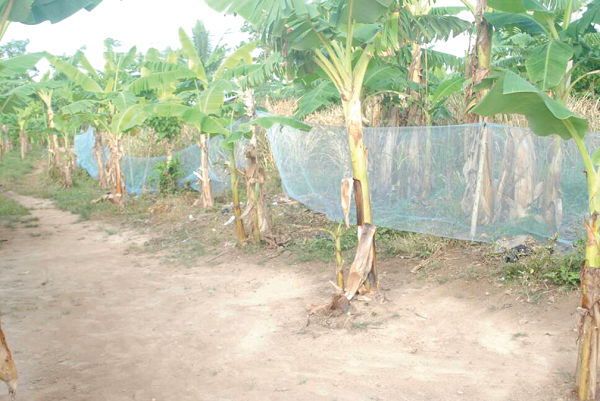The government’s efforts to fight malaria seem to be in danger as treated mosquito nets meant to prevent mosquito bites are being used as barns and for fencing to ward off animals from entering backyard gardens in most malaria-prone communities in the Adansi District of the Ashanti Region.
The nets, procured by benevolent groups, including the AngloGold Ashanti Malaria Control Team, were distributed to over 38 communities in the district.
The distribution was based on the number of people per household in areas such as Fomena, Dompoase, Asokwa Junction, Nyankumasu, Tewobaabi, Adiembra, Aboabo, New Edubiase and Kyekyewere.
For example, a family of about 15 people were entitled to 15 or more packs of treated mosquito nets.
The nets include DawaPlus 2.0, a World Health Organisation Pesticide Evaluation Scheme (WHOPES)-recommended treated net noted for its efficacy in fighting malaria and other vector-borne diseases.
The Mirror’s visit to most of the communities revealed that the practice was prevalent in communities such as Adiembra, Asokwa Junction, Dayaase, Tewobaabi and New Edubiase.
Confirmed usage
Residents in the area confirmed to The Mirror that the practice of using the treated nets was to protect their backyard gardens from invasion by animals.
Ms Akosua Amoaa of Adiembra, one of the farming communities in the area, said: “We were using bamboo for fencing but it became difficult getting the bamboo so we resorted to the use of the treated net. We have realised that the animals, especially sheep, are unable to jump over the net to destroy our crops in our backyard gardens.”
Another resident, Akua Afriyie, has never slept under any of the mosquito nets supplied to her. Instead, she uses them as a fence because “you have no problem with the animals”.
An elder of Adiembra, Nana Barimah Amponsah, despite confirming the ‘treated net fence craze in the district’, also expressed concern about the practice, saying: “It is strange; it has been going on for the past three years.
“Unfortunately, some teachers in the communities who are supposed to educate the community members on the benefits of treated mosquito nets are also using them as fences.”
According to him, his checks indicated that the nets were readily available at health facilities in the area and residents had unfettered access to them; but they had chosen to use them for the wrong purposes.
‘’People can even go to the Fomena Clinic for more. They prefer to sew the nets and even use them for fencing on a large scale,” Nana Amponsah lamented.
He, therefore, appealed to health authorities to ensure some sanity in the distribution and use of treated mosquito nets in the district.
According to the Ghana Statistical Service, the Adansi District has a household population of 105,324 with a total number of 23,863 households.
The statistics indicate that children constitute the largest proportion of each household.
Misuse of net
The Mirror investigation also revealed that the misuse of the treated nets is also prevalent in most communities along the coastal areas in the country. Here, most beneficiaries are said to be using them for fishing.
Drop in malaria cases
The then Programme Manager of the Malaria Control Programme, Dr Constance Bart-Plange, at the commemoration of the 2017 World Malaria Day, disclosed that malaria-related deaths in all ages had reduced from 3,882 in 2010 to 1,264 in 2016.
She attributed the drop to an increase in household ownership of insecticide treated bed nets.
Statistics from the 2016 Ghana Malaria Indicator Survey (GMIS) also confirms that Ghana recorded a tremendous drop in malaria cases and death. The statistics indicated an over 50 per cent reduction in 2012 to 20.4 per cent in 2016.
Nonetheless, the WHO is still urging countries and partners to accelerate the pace of action towards malaria prevention, especially in low-income areas with a high disease burden, an indication that more pragmatic measures should be taken by governments to consolidate gains made in the fight against malaria.
Malaria Control Programme
Since 2005, Anglogold Ashanti has, as part of its social responsibility policy, introduced indoor residual spraying to fight the female anopheles mosquitoes and provided education on the uses of treated mosquito nets to the Adansi communities, in addition to free distribution of the nets.
Recently, the team was awarded for its effective role in eradicating malaria from the communities where it operates.

